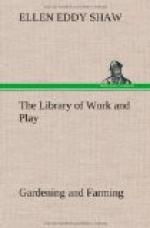Philip’s clearing up seemed to be catching for the girl across the street started in with her work. For ten cents she bought a collection of flower seed. These seed were planted in three-foot beds. The beds were banked up or supported by strips of board. This same girl planted flowers in two old kettles and set one upon an empty cask and the other on an old drain tile. But she later decided very wisely that this was not after all so very pretty. Kettles are better for potato boiling than for flowers.
But such a good time as she had all summer in her own green, pleasant backyard! And so had Philip, too! “Just a few cents and some hard work will change your backyard into something beautiful,” Philip was heard to say one day to a group of city boys.
XIV
THE CORN CONTEST
Each boy was to take a certain number of hills of corn in his father’s corn patch. He was to select his seed corn after a few suggestions given him by The Chief. These hills of selected corn were to be cared for by the boy himself, but it was perfectly legitimate that the soil be prepared for him, since most of the boys were to plant in their fathers’ cornfields.
In the growing of corn the first matter for a boy or girl to consider is the selection of the seed. Corn should be selected carefully by the individual stalk; that is, choose ears from stalks bearing an ear or ears at, or a little below, the middle of the stalk.
The stalk itself should be thick and free from suckers or any evidence of disease. The ear should be cylindrical. The kernels should be deep setting, uniform and compact. Then the cob should not be too large. Look at some samples. See how some ears have too large a cob, others too small, while still others show a right amount of cob.
The butt and tip of the ear should be well filled out. Look for a perfect ear. The kernels are uniform in size, in even rows, with only a slight space between rows. See the tip and butt. Very little space is lost at the butt. You have seen ears where the butt was all space.
There is still another sort of corn. It might be called mongrel. Any one can raise such corn. Good care shows in corn as good breeding does in boys and girls.
One more point the boys were told to consider in selecting seed ears, that was the relation of the circumference of the ear to its length. An ear should have a fairly large circumference at the base and taper toward the tip. To estimate relation of circumference to length, which should be as three is to four, measure the ear one-third the distance from butt to tip. So if the ear is eight inches long the circumference should be about six inches.




